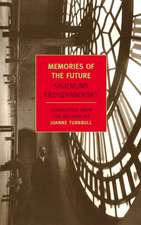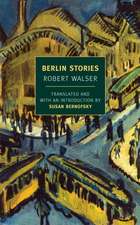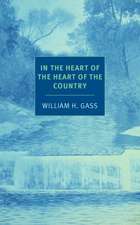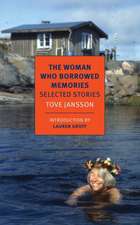Autobiography of a Corpse
Autor Sigizmund Krzhizhanovskyen Limba Engleză Paperback – 15 ian 2014
Preț: 100.73 lei
Nou
19.28€ • 20.05$ • 15.91£
Carte disponibilă
Livrare economică 24 martie-07 aprilie
Livrare express 07-13 martie pentru 21.18 lei
Specificații
ISBN-10: 1590176707
Pagini: 230
Dimensiuni: 129 x 205 x 14 mm
Greutate: 0.27 kg
Editura: NEW YORK REVIEW OF BOOKS
Notă biografică
Sigizmund Krzhizhanovsky (1887ߝ1950) studied law and classical philology at Kiev University. In his philosophical and satirical stories with fantastical plots, he ignored official injunctions to portray the new Soviet state in a positive light, and three separate efforts to print different collections were quashed by the censors, a fourth by World War II. Not until 1989 could these surreal fictions begin to be published. Both his story collection, Memories of the Future, and his novel, The Letter Killers Club, are available from NYRB Classics.
Adam Thirlwell is the author of the novels Politics and The Escape, an essay on novels, The Delighted States, and most recently the experimental book with folding pages, Kapow!. He lives in London.
Joanne Turnbull has translated a number of books from Russian, including Krzhizhanovsky’s The Letter Killers Club and Memories of the Future (short-listed for the Best Translated Book Award), both available from NYRB Classics.
Recenzii
“Curiously, one of the most startling qualities of his work is the directness with which it addresses our 21st-century concerns. It’s as if the Soviet editors were right: Krzhizhanovsky now seems more our contemporary than theirs.... It is now clear that Krzhizhanovsky is one of the greatest Russian writers of the last century.” —Robert Chandler, Financial Times
“Krzhizhanovsky wanted to perform imaginary experiments with the nature of time and space. Outside, in the streets, the Communist state was busy performing such experiments for real. In response, Krzhizhanovsky’s prose has a recklessly unstable tone in which delighted examination of impossible worlds can slip into ferocious political sarcasm.... It is a method for investigating how much unreality reality can bear.” —Adam Thirlwell, The New York Review of Books
“A Russian writer whose morbidly satiric imagination forms the wild (missing) link between the futuristic dream tales of Edgar Allan Poe and the postwar scientific nightmares of Stanislaw Lem...an impish master of the fatalistically fantastic.” —Bill Marx, The World
“Krzhizhanovsky is often compared to Borges, Swift, Poe, Gogol, Kafka, and Beckett, yet his fiction relies on its own special mixture of heresy and logic...phantasmagoric.” —Natasha Randall, Bookforum
“Krzhizhanovsky’s stories are more like dream diaries than fiction. Quite intentionally, he blurs the line between sleep and waking, real and unreal, life and death. While his translators admirably convey the whirligigging quality of his narratives, Krzhizhanovsky’s peregrinations demand unstinting focus and frequent compass checks. His characters often seem half, or wholly, asleep.... In Krzhizhanovsky’s tales, relics of a future past, he transports readers back to the present he renounced, to a life that’s ‘not-life, a gap in existence’—a place from which he sought refuge in fiction and dreams.” —Liesl Schillinger, The New York Times Book Review
“There was probably no worse time and place to be a postmodernist sage than in 1920s Russia. Still, bibliophiles like to believe that genius makes itself known, regardless of social pressures, and in the case of Ukraine-born Sigizmund Krzhizhanovsky, they may have a point—only it took about six decades for anyone else to catch on.... For all the cemetery...Krzhizhanovsky is also hilarious, and one wonders whether that might have troubled the Bolsheviks as much as anything in his work. Krzhizhanovsky understood the potency of juxtaposing wit with terror and the sacred with the profane.” —Los Angeles Times
“Krzhizhanovsky is not interested in picking apart the sense-making mechanisms of language that readers take for granted. Instead he is feeling out ways of conveying both the quotidian dreariness and the horrifying threat of violence of 1920s Soviet life.... Turnbull writes in the introduction that a Soviet editor dismissed Krzhizhanovsky’s work as “untimely,” a common shorthand for fiction that was not politically correct. But of course Krzhizhanovsky’s stories are exactly and deliberately timely: they observe the follies and cruelties of early Soviet life.” —Elaine Blair, The Nation
“[A]n awareness has grown that Krzhizhanovsky belongs with the best of the Russian prose writers who came to maturity in the post-Revolutionary decade. Like them, he sought and developed a new aesthetic in an altered world; and like them, he was soon thrown back on himself.” —Oliver Ready, Times Literary Supplement
Descriere
Virtually unpublished during his lifetime, Sigizmund Krzhizhanovsky’s fantastic and blackly comic philosophical fables have since 1989 earned him a reputation as one of the greatest Russian writers of the twentieth century. Included in this collection of eleven newly translated tales are some of his strangest and most brilliant conceits: a provincial journalist who moves to Moscow finds his existence consumed by the autobiography of his room’s previous occupant, a suicide who vacated his hundred square feet in exchange for his successor’s consideration of his manuscript; the fingers of a celebrated pianist’s right hand run away to spend an abrasive night alone on the city streets; a man’s lifelong quest to bite his own elbow inspires both a wildly popular circus act and a new refutation of Kant; a desperate energy crisis is resolved through the systematic exploitation of the one substance to reliably increase along with the dysfunctions of modern life: bile, or “yellow coal.” Abounding in nested narratives, wild paradox, and improbably high stakes—what would you do if a Stygian toad landed on your pillow one night and asked for help in saving the world by building a bridge to death?—the unlikely stories in Autobiography of a Corpse ask you to take a second look at the cracks in everyday reality.










